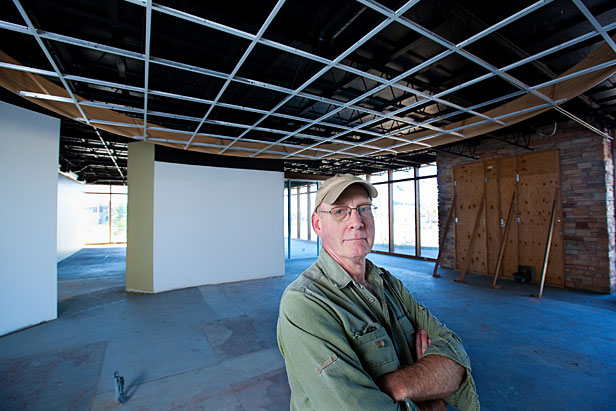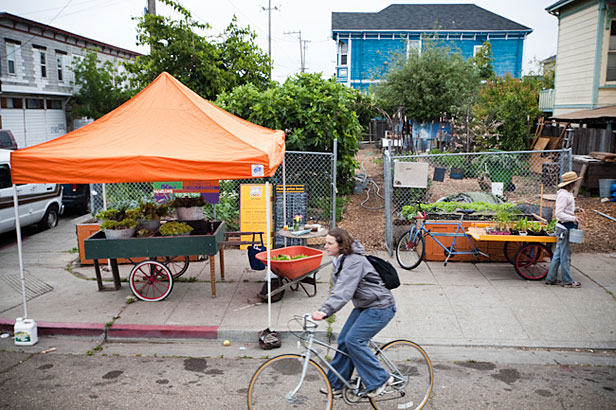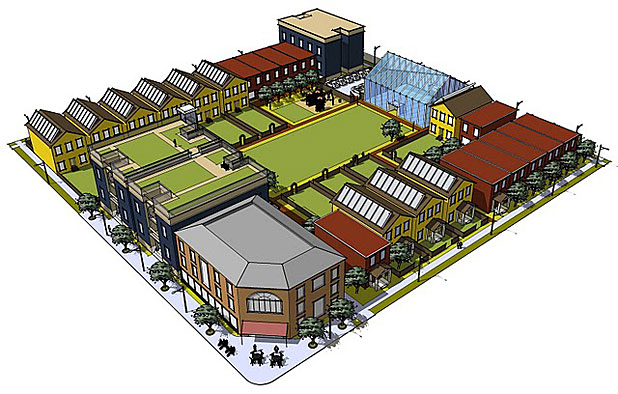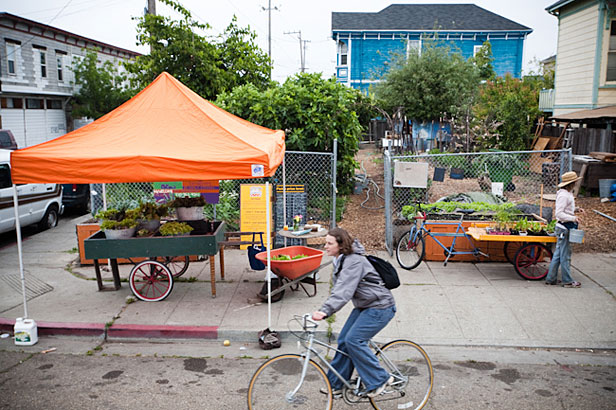
One of City Slicker Farms’ tiny but productive sites in West Oakland, California. Much of the produce is grown vertically, to maximize space, and there’s a chicken coop tucked in the back corner. Photo courtesy of Anne Hamersky, from the forthcoming book Farm Together Now
Giant cranes guard the waterfront on the port city of Oakland, California’s western flank, brashly broadcasting the city’s industrial past and present to all who fly in, drive by, or walk through one of the Bay Area’s grittiest urban locales.
Yet in the same West Oakland neighborhoods that boast industrial diesel pollution from the bustling port and shockingly high poverty rates, urban food activism has flourished.
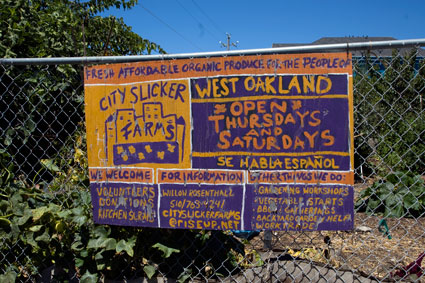
City Slicker Farms in West Oakland has a sliding-scale farmers market, a backyard-garden program, and sells vegetable starts as well.
Bonnie Powell
“We’re trying to grow as much food as possible for the community,” said City Slicker Executive Director Barbara Finnin.
Started in 2001, City Slicker Farms is one of the oldest food and farming organizations in Oakland. Founded by activist Willow Rosenthal, the group, along with the food justice nonprofit People’s Grocery, has become an incubator and hub for agtivists who want to make fresh, healthy food available to all Oaklanders, especially those low-income communities and communities of color who typically have reduced access to quality produce at affordable prices.
Nonprofits like City Slicker and People’s Grocery have been around for nearly a decade. The city of Oakland is nationally known in sustainable foodie circles as a locus for activism on urban farming and food justice. But the city’s grassroots food and agriculture movement faces a challenge in scaling up that will require significant investment and public sector support.
In January 2006, when Jerry Brown was mayor, the Oakland City Council commissioned a study to examine what it would take to produce 30 percent of the city’s food locally. Two University of California, Berkeley doctoral students completed the work and recommended that Oakland create a Food Policy Council to advise the city on how it could meet that goal.
One mayor and nearly four years later, the Oakland Food Policy Council has a structure and regular meetings, but progress on policy change is slow, and with budget cuts roiling the city, forcing it to take unprecedented measures like laying off 10 percent of its police force, it’s unclear if Oakland will have the foresight, or the dollars, to prioritize citywide changes in food policy.
Unlike in Seattle or San Francisco just minutes across the Bay, say, which have aggressively moved to prioritize food security and encourage urban agriculture efforts (see “Smart cities are (un)paving the way for urban farmers and locavores“), Oakland’s have flourished through benign neglect.
In some ways, the absence of policy has been an encouragement to urban food production, says Novella Carpenter, West Oakland urban farmer and Farm City author (see Grist’s interview). Carpenter says Oakland’s lack of regulation against raising animals encouraged her to raise a variety of livestock, from honeybees to hogs.
“A lot of cities, for instance, have laws against even having chickens,” she points out. But Oakland has no such law, and hasn’t made it a priority to enforce the few livestock regulations it does have.
“There’s no officer that’s patrolling looking for roosters or male goats [both illegal],” she added. “As long as your neighbors are cool with you having pigs it’s fine.”
Sometimes the neighbors aren’t just “cool with” pigs, they even let you harvest their backyard fruit. That’s the premise behind Forage Oakland, an art project/food bartering network that lets those seeking fruit connect with those who have too much. The project’s goal is not just to keep excess fruit from going to waste, but also to strengthen neighborhood ties by getting neighbors who otherwise wouldn’t interact to connect via fruit.
Projects like Forage Oakland seem to spring up all over Oakland’s funky, fertile activist soil. There’s Planting Justice and Phat Beets Produce (see spotlights below), and Oakland Food Connection, a group that builds school gardens and works with communities and youth to grow food in East Oakland.
A number of these new groups are run by people who first connected with food justice in Oakland via People’s Grocery, an organization that has helped redefine food justice by vigorously educating those who work with it about the systemic causes behind lack of access to fresh and healthy food in low-income communities.
Jason Harvey, the executive director of Oakland Food Connection, which expands the food justice movement into Oakland’s eastern neighborhoods, said the time he spent working as a farmers market manager at People’s Grocery educated him on the disparity between income levels and access to healthy food in Oakland.
In East Oakland, for instance, there is only one grocery store (and 32 liquor stores) for a population of over 30,000, whereas in Oakland’s wealthier Piedmont and Montclair neighborhoods, with a similar number of people, have four supermarkets and half the number of liquor stores.
Five years into his term at Oakland Food Connection, Harvey now talks about combining policy change with the grassroots activist movement he’s long been a part of. Harvey expressed some frustration with the failure of Oakland politicians to imagine alternative futures for the city that might involve, say, cooperative, community-owned grocery stores.
Overall, though, he’s optimistic.
“There’s a number of people right now who are working on trying to create some citywide food justice strategies. I’m one of those people, sitting at the table right now with the executive directors of People’s Grocery and City Slicker Farms,” Harvey said.
Whether Harvey and his cohorts’ strategies to bring systemic change to Oakland’s food system will work remains to be seen. In the meantime, Oakland urban farmers and food justice fighters will keep on growing food, raising livestock, bartering fruit, holding garden work parties and produce exchanges — creatively working to feed themselves and others good, clean, and just food.
Project spotlights
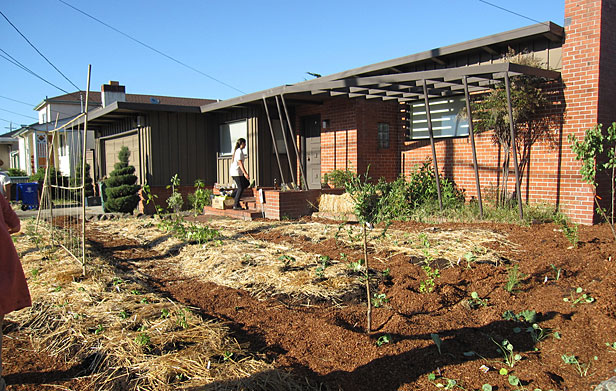
In just one day, nine Planting Justice volunteers spread 2,000 square feet of cardboard and 18 cubic yards of compost and mulch, and planted dozens of veggies, herbs, flowers, fruit trees, and shrubs to create this front-yard mini-farm in Richmond, Calif. Planting Justice via Flickr
Planting Justice
North Oakland
Permaculture teacher Gavin Raders and community activist Haleh Zandi decided to turn their successful garden installation business into a permaculture-focused food justice nonprofit. Planting Justice uses its for-profit permaculture installation program — called Transform Your Yard — to fund its mission of bringing healthy food to low-income Oakland residents. For every four gardens Raders and Zandi install with their business, they can install one for free in a low-income household. They also run a community garden in a large North Oakland apartment complex, teach free classes on growing plants and permaculture on their rooftop garden, and support an “edible forest” community garden effort in East Oakland.
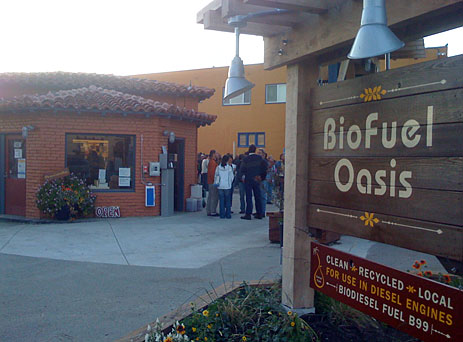
The Biofuel Oasis offers veggie oil and urban-farming classes and supplies.
Bonnie Powell
Biofuel Oasis
Berkeley-Oakland border
Created by Novella Carpenter and her farmer friends in May 2009, the Biofuel Oasis is much more than a renewable energy pit stop — it’s an urban farm store and hub where aspiring farmers can learn how to raise food in the city.
The affordable classes and equipment it offers include recycling gray water for irrigation, raising and butchering rabbits, keeping bees and goats, and preserving the fruits of his or her labor. You can get your organic chicken feed and beekeeping equipment there, too.
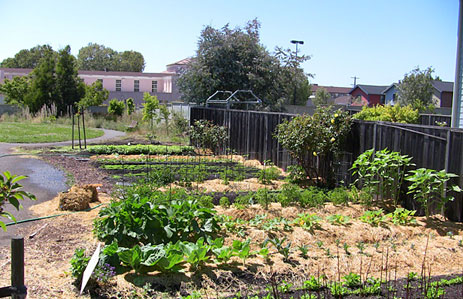
The Healthy Hearts Youth Market Garden in North Oakland grows greens, tomatoes, basil, squash, and other seasonal vegetables. Phat Beets
Phat Beets Produce
North Oakland
Executive Director Max Cadji, who also works for People’s Grocery, started this youth-focused food justice nonprofit with a guerilla produce farmers market selling affordable foods in an Oakland park in 2007. Phat Beets now hosts two farmers markets where producers sell their goods at affordable prices to North Oakland residents. It recently collaborated with the Oakland’s Children’s Hospital and Research Center, where the farmers markets are hosted, to start an obesity prevention garden in a small North Oakland neighborhood. And beginning in June, Phat Beets is operating the Healthy Hearts Youth Market Garden, along with community members of the Dover neighborhood and park, and the patients of the Healthy Hearts Clinic at Children’s Hospital.
